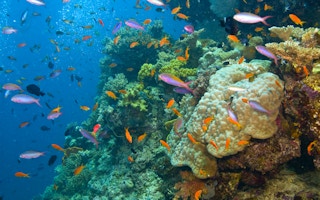Climate change advocates have panned the Australian government’s 2016 to 2017 Budget, unveiled on Tuesday, as “a travesty to the environment“, and one that prioritises polluting industries such as coal and gas over the people it was elected to represent.
To continue reading, subscribe to Eco‑Business.
There's something for everyone. We offer a range of subscription plans.
- Access our stories and receive our Insights Weekly newsletter with the free EB Member plan.
- Unlock unlimited access to our content and archive with EB Circle.
- Publish your content with EB Premium.
Not only did the government fail to make further funding commitments to reducing greenhouse gas emissions, it also cut support for renewable energy development while continuing to dish out subsidies for coal and natural gas companies, said critics.
The Budget, planned by Australia’s ruling Liberal Party - helmed by Prime Minister Malcolm Turnbull - and presented on Tuesday night by Treasurer Scott Morrison, comes weeks before a federal election that will most likely be held on July 2.
It also follows a spate of reports about unprecedented coral bleaching in the Great Barrier Reef, a type of ecosystem deterioration that has been attributed to rising global temperatures.
Larissa Walters, climate change and environment spokesperson of the Australian Greens party, said in a statement that “the Liberals’ budget is a missed opportunity to lead in the global transition to a clean economy that provides jobs in clean energy and public transport, and tackles global warming”.
The budget focused heavily on the theme of “jobs and growth”, offering multiple tax cuts to small and large businesses and middle-income earners, among other measures.
But it did not allocate any new moniesto Australia’s Emissions Reductions Fund, which along with other initiatives is responsible for meeting the country’s targets to cut emissions. The Government has provided A$2.55 billion to establish the fund, with more funding possible in the future.
Nicholas Aberle, campaign manager at non-profit Environment Victoria, said that this lack of additional financing “shows that the Turnbull Government currently has no plan for cutting Australia’s pollution”.
“The Coalition must now deliver pre-election announcements of strong regulatory measures to deal with global warming, such as a schedule to phase out our oldest and dirtiest coal-burning power stations,” he added.
However, Matthew Bell, professional services firm EY’s Oceania leader for climate change and sustainability, noted that “we are unlikely to hear more in the lead up to the election from the incumbent government”, as evidenced by recent comments by Environment Minister Greg Hunt that current mechanisms will be enough to meet Australia’s targets.
But there is a review scheduled in 2017 to assess if the government is on track to meet its 2020 targets, and what more it needs to do to meet its commitment to reduce emissions by 26 to 28 per cent on 2005 levels by 2030.
“Many commentators say we’ll need to do much more to hit more stringent carbon emissions reduction targets, but what form that takes is still unknown,” said Bell.
“
As the Reef undergoes the worst bleaching event in history and temperatures rise to unprecedented levels, it is unconscionable for our politicians to be propping up the companies driving these tragic impacts.
Blair Palese, chief executive officer, 350.org Australia
For now, the Budget gave no indication of a shift away from fossil fuels. Green groups noted that the government continues to give out about A$7 billion every year in subsidies through its Fuel Tax Credit Scheme, a national programme to offset high fuel costs.
The Budget also allocated A$100 million to exploration activities for new gas and mineral resources in northern and South Australia, a move aimed at revitalising the declining mining sector and creating new jobs.
But Walters noted that “a better budget would have invested in clean energy, not dirty energy, to help save the 69,000 jobs the Reef provides”.
Blair Palese, chief executive of climate campaigning group 350.org Australia, labelled it a “coal and gas budget”.
“As the Reef undergoes the worst bleaching event in history and temperatures rise to unprecedented levels, it is unconscionable for our politicians to be propping up the companies driving these tragic impacts,” she said.
The government recently announced an A$1.3 billion funding cut to the Australian Renewable Energy Agency (ARENA), a move which Environment Victoria’s Aberle says “show that the Turnbull Government has chosen to destroy the jobs and growth that come with renewable energy investment and instead prop up old, polluting interests”.
The one seemingly bright spot for the environment in Tuesday’s budget was a A$171 million boost for efforts to protect the Great Barrier Reef. However, a report in The Guardian showed that this figure did not comprise new funds, but was a reallocation of money already pledged to environmental programmes.
The Liberal Party - led till last September by Tony Abbot and later by Turnbull - has had a track record of “relentless attacks on our environment, combined with a systematic dismantling of measures to cut carbon pollution,” noted Aberle.
At the upcoming Federal Election, “Australians have the opportunity to push the reset button on our nation’s policies to reduce global warming and restore our environment”, he said.
Palese added: “it’s time for voters to decide who will protect essential services like health, clean energy and education, and who will continue to pander to the big polluters”.










